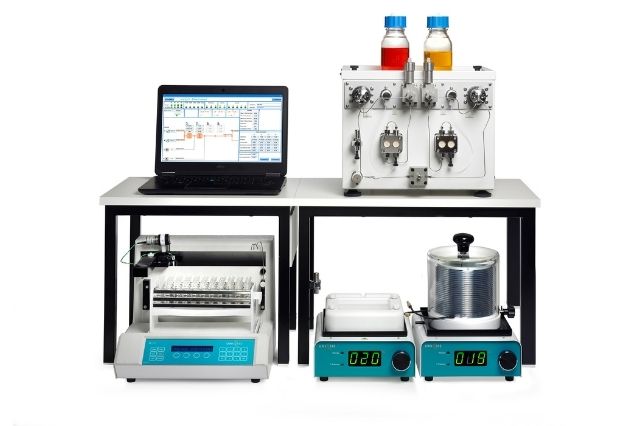RAFT Polymerization in Flow Chemistry Reactors
overview
- Contribution by ::
- Source: Uniqsis
- date:: March 10, 2021
Uniqsis reports that researchers at the Helmholtz Center Institute for Membrane Research (Geesthacht, Germany) are using a FlowLab Plus flow chemistry system with reactor blocks made from static glass mixers to synthesize well-defined polymers.
The synthesis of well-defined polymers with a narrow molecular weight distribution has traditionally been achieved using anionic polymerization methods. A precise control of the molecular weight achieved in this way is, however, associated with a very high sensitivity to impurities, temperature changes and rapid polymerization rates, which leads to high demands on process control and demanding laboratory work. More recently, radical polymerization processes such as the Reversible Addition-Fragmentation Chain Transfer (RAFT) polymerization technique have been the focus of polymer research as an alternative method for synthesizing well-defined polymers from a variety of monomers.
In a new article by the Helmholtz Institute, a model-based approach to the development and optimization of a flow chemical reaction system for the RAFT polymerization of MMA is presented. Reaction kinetics and a heat transfer model were used together with inline NMR spectroscopy to gain insight into the polymerization process and develop strategies for process optimization. A screening procedure was used to examine a wide range of different residence times in a single experiment. Adjustments were made to the composition of the reaction mixture, the temperature and the reactor design of the flow chemistry.
Download technical document 67 (https://www.uniqsis.com/fcPublications.aspx#2115) to find out how well-defined polymers can be synthesized.
Developed by chemists for chemists, FlowLab Plus ™ is a versatile, modular flow chemistry system based on the Uniqsis Binary Pump ™ two-channel reagent delivery system. The system is configured to perform both manual and automated fluid chemistry reactions. The system can be configured with any combination of up to 4 individual reactor modules. A variety of configurations are possible.
In order to achieve a highly reproducible scale-up of the flow chemistry, the control of the mixing and the temperature is essential, especially for polymerization reactions. Precision engineered from inert borosilicate glass to withstand a wide range of temperatures – Uniqsis’ GSM Glass Static Mixer (GSM) chip reactor blocks have been proven to produce a highly efficient, turbulent, mixed flow of reagents.
Further information is available at www.uniqsis.com or from Uniqsis at + 44-845-864-7747 / [email protected].



Comments are closed.